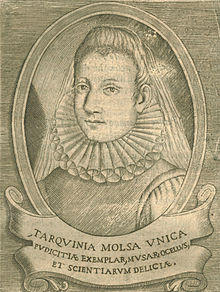music.wikisort.org - Poet
Tarquinia Molza (1 November 1542 – 8 August 1617) was an Italian singer, poet, conductor, composer, and natural philosopher.[1][2] She was considered a great virtuosa. She was involved with the famous Concerto delle donne, although whether she sang with them or coached them is not clear.[3] She also played the viola bastarda.

Early life and education
Molza was born in Modena, the granddaughter[4][5][6] of the poet Francesco Maria Molza, and the daughter of Camillus and Isabella Colombi.[7] Her father agreed that she should have the same education as her brothers, and she learned Greek, Latin, Hebrew, and philosophy until she was sixteen.[7] She studied with the scientist John Politiano and the poet Francis Patrizio, and learned astronomy from the mathematician Antony Guarini.[8] She married Paolo Porrino in 1560, who supported her returning to school, where she studied with Francesco Patrizi.[7] She was widowed by 1579.
Musical career
By 1583 she was living in Ferrara in the official capacity of lady-in-waiting to Duchess Margherita Gonzaga d'Este, where she was a famous performer, conductor, and composer. Molza was dismissed from her position in 1589 and returned to Mantua when she was accused of having an affair with Flemish composer Giaches de Wert. Minor nobility (as ladies-in-waiting to the duchess were considered) were not to involve themselves with members of the servant class (as minor composers such as Wert were considered).[5][9] She claimed that her relationship with Wert was a friendship, and not sexual.[10]
Works
Molza wrote poetry in Latin and Tuscan dialect; she also wrote essays.[8]
Literary and Artistic Representations
Many artistic works were dedicated to her; Francesco Patrizi wrote about her singing in his treatise L'amorosa filosofia, and she was perhaps the first singer to have a published biography dedicated to her (Opuscoli inediti di Tarquinia Molza modenese by D. Vandelli).[11]
Her name appears among those on the Heritage Floor of Judy Chicago's The Dinner Party.[12]
Honors
Molza was granted Roman citizenship in 1600, the only woman to have citizenship. The decree stated, "although the Senate has never accepted women in to the ranks of citizenship…[it is resolved that] Tarquinia Molza of Modena be numbered in the ranks of its most noble citizens with the title l'Unica, never before bestowed on anyone, in recognition of her singular virtues and merits."[7]
Notes
- Drinker, Sophie (1999). Music and women : the story of women in their relation to music ([Reprinted] ed.). New York: The Feminist Press at the City Univ. of New York. p. 222. ISBN 978-1558611160.
- Ogilvie, Marilyn Bailey (1986). "Molza, Tarquinia". Women in science : antiquity through the nineteenth century : a biographical dictionary with annotated bibliography (Reprint. ed.). Cambridge, Mass.: MIT Press. p. 139. ISBN 978-0262650380.
- The Grove article on Tarquinia Molza says that she did not sing with them, however the "Women in Music" article says she did sing with them.
- Patrizi, Francesco (1577). Nelson, John Charles (ed.). L'Amorosa Filosofia (in Italian). Firenze (1963): Felice Le Monnier.
Nacquero di (Francesco Maria Molza) Camillo; Del cavaliere Camillo adunque per primo figlio la padrona Tarquinia
{{cite book}}: CS1 maint: location (link) - Newcomb, Anthony. "Molza, Tarquinia". Grove Music Online. Oxford University Press. Retrieved 24 May 2014.
- Riley, Joanne (1987). "Tarquinia Molza (1542 - 1617): A Case Study of Women, Music and Society in the Renaissance". In Zaimont, Judith Lang; Overhauser, Catherine; Gottlieb, Jane (eds.). The musical woman : an international perspective, volume II, 1984-1985. Westport, Conn.: Greenwood Press. pp. 470–493. ISBN 978-0313235887.
- Jaffe, Irma B. and Gernando Colombardo (2002). Shining Eyes, Cruel Fortune: The Lives and Loves of Italian Renaissance Women Poets. New York: Fordham University Press. p. 311. ISBN 978-0823221806.
- Mossman, Samuel (1870). Gems of Womanhood, Or, Sketches of Distinguished Women in Various Ages and Nations. Edinburgh: Gall & Inglis. p. 135.
- Fenlon, Iain. "Wert, Giaches de". Grove Music Online. Oxford University Press. Retrieved 24 May 2014.
- Project Continua. "Tarquinia Molza". Archived from the original on 3 February 2014. Retrieved 1 February 2014.
- Jander, Owen; Elizabeth Forbes, Stanley Sadie, J.B. Steane, Ellen T. Harris, Gerald Waldman. "History to c1600". Soprano. Grove Music Online. Oxford University Press. Retrieved 24 May 2014.
{{cite encyclopedia}}: CS1 maint: multiple names: authors list (link) - "Elizabeth A. Sackler Center for Feminist Art: The Dinner Party: Heritage Floor: Tarquinia Molza". Brooklyn Museum.
References
- Stevenson, Jane. Women Latin Poets (Oxford, 2005), 288-91.
External links
На других языках
- [en] Tarquinia Molza
[fr] Tarquinia Molza
Tarquinia Molza, née le 1er novembre 1542 à Modène et morte dans cette même ville le 8 août 1617 (à 74 ans), est une compositrice, musicienne (chant et viola bastarda), poétesse et naturaliste italienne de la Renaissance.[ru] Мольца, Тарквиния
Тарквиния Мольца (итал. Tarquinia Molza, 1 ноября 1542 — 8 августа 1617) — итальянка-певица, поэт и естествоиспытатель. Она считалась виртуозом и многие художественные произведения были посвящены ей; Франческо Патрици писал о её пении в своём трактате L’amorosa filosofia, и она была, скорее всего, первой певицей с опубликованными биографиями, посвящёнными ей (Opuscoli inediti di Tarquinia Molza modenese авторства Д. Ванделли)[1]. Она была связана с известным Concerto delle donne, хотя пела ли она с ними или тренировала их, неясно. Мольца также играла на виоле-бастарда.Другой контент может иметь иную лицензию. Перед использованием материалов сайта WikiSort.org внимательно изучите правила лицензирования конкретных элементов наполнения сайта.
WikiSort.org - проект по пересортировке и дополнению контента Википедии